Impact of Organisational Aspects on Individual and Team Conduct
VerifiedAdded on 2023/02/02
|17
|5274
|29
AI Summary
This report discusses the impact of key organisational aspects on individual and team conduct, including culture, politics, and power. It also explores content and process theories of motivation and their application in the workplace. The report concludes with an analysis of team and group development theories and the concepts and philosophies of organisational behaviour.
Contribute Materials
Your contribution can guide someone’s learning journey. Share your
documents today.
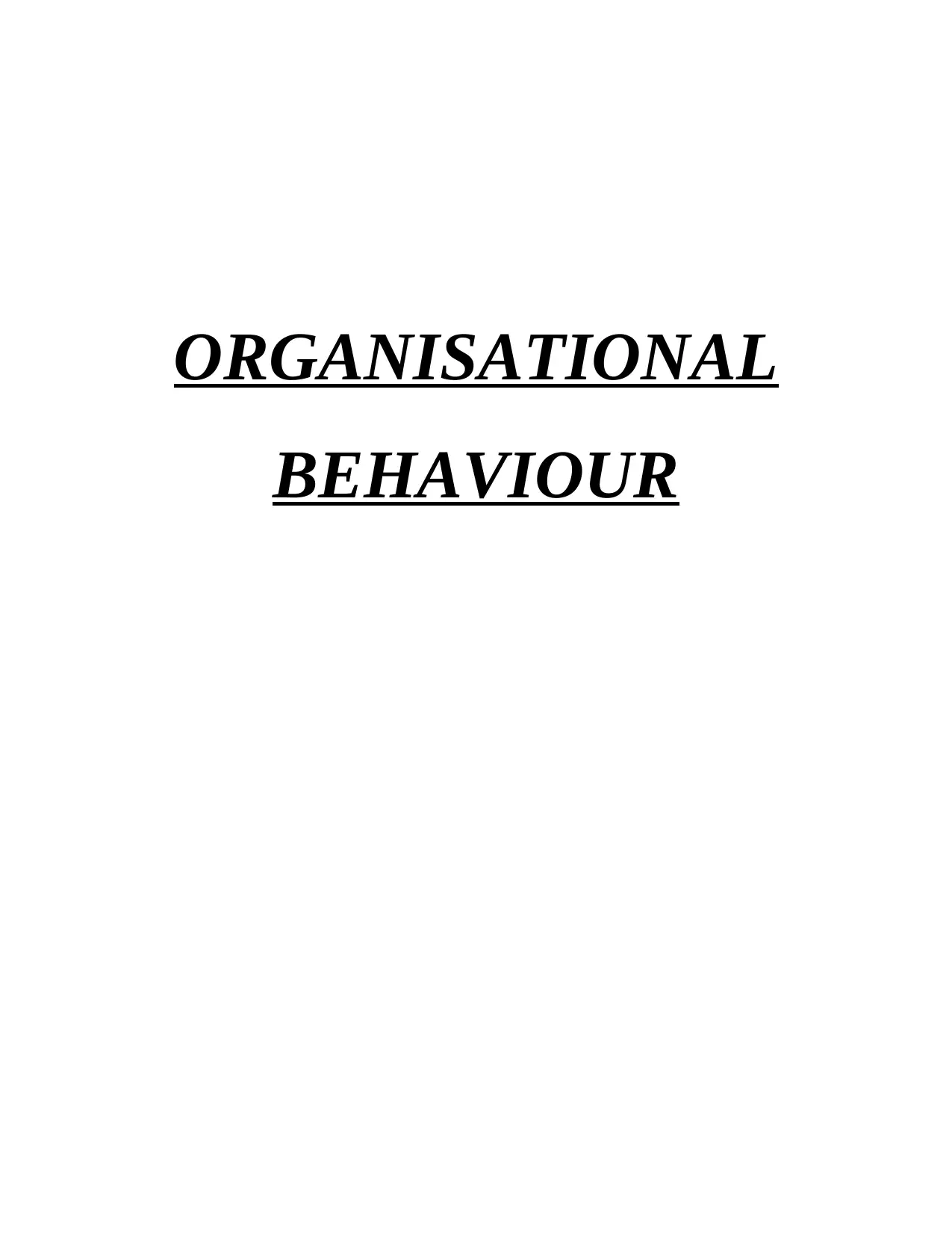
ORGANISATIONAL
BEHAVIOUR
BEHAVIOUR
Secure Best Marks with AI Grader
Need help grading? Try our AI Grader for instant feedback on your assignments.
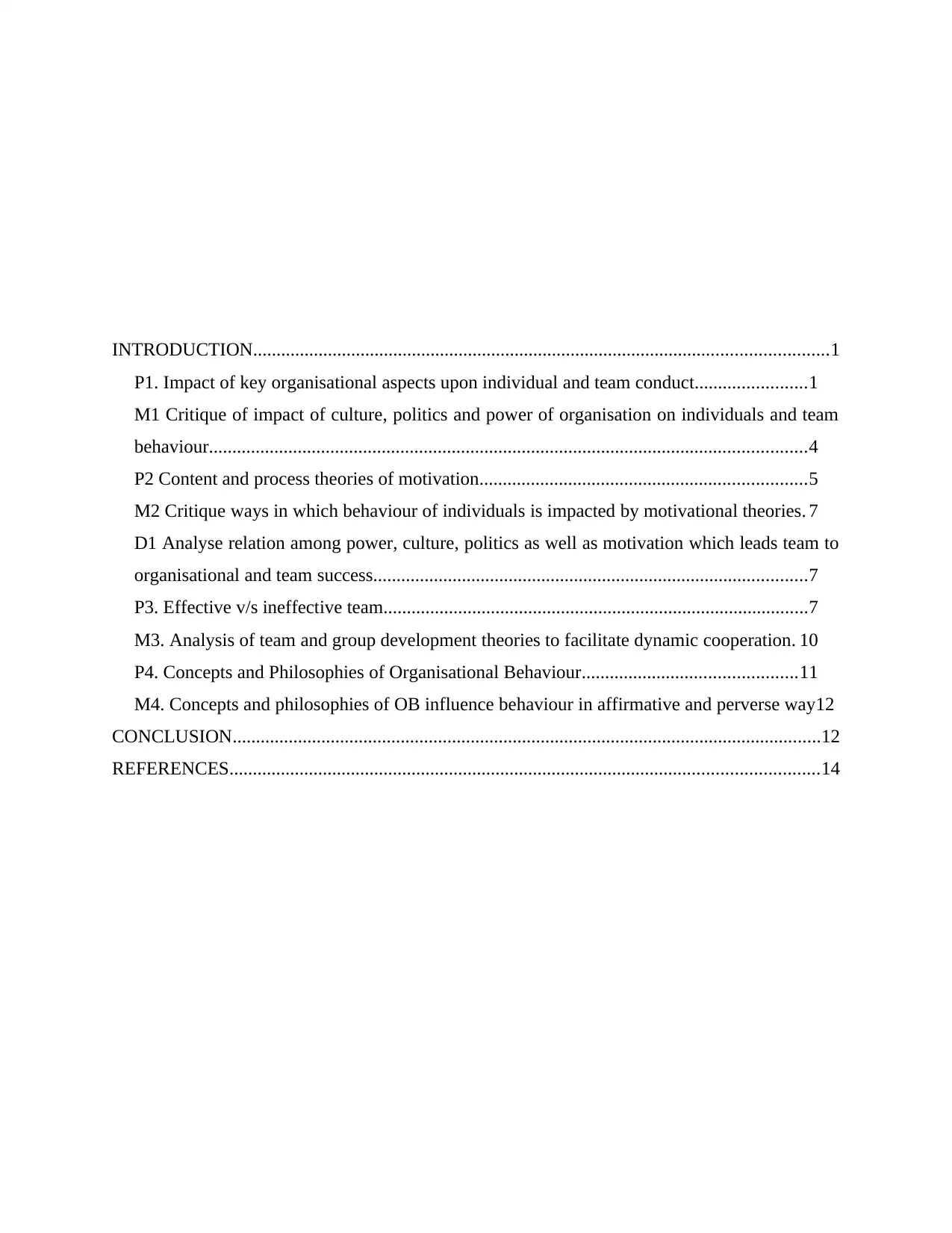
INTRODUCTION...........................................................................................................................1
P1. Impact of key organisational aspects upon individual and team conduct........................1
M1 Critique of impact of culture, politics and power of organisation on individuals and team
behaviour................................................................................................................................4
P2 Content and process theories of motivation......................................................................5
M2 Critique ways in which behaviour of individuals is impacted by motivational theories. 7
D1 Analyse relation among power, culture, politics as well as motivation which leads team to
organisational and team success.............................................................................................7
P3. Effective v/s ineffective team...........................................................................................7
M3. Analysis of team and group development theories to facilitate dynamic cooperation. 10
P4. Concepts and Philosophies of Organisational Behaviour..............................................11
M4. Concepts and philosophies of OB influence behaviour in affirmative and perverse way12
CONCLUSION..............................................................................................................................12
REFERENCES..............................................................................................................................14
P1. Impact of key organisational aspects upon individual and team conduct........................1
M1 Critique of impact of culture, politics and power of organisation on individuals and team
behaviour................................................................................................................................4
P2 Content and process theories of motivation......................................................................5
M2 Critique ways in which behaviour of individuals is impacted by motivational theories. 7
D1 Analyse relation among power, culture, politics as well as motivation which leads team to
organisational and team success.............................................................................................7
P3. Effective v/s ineffective team...........................................................................................7
M3. Analysis of team and group development theories to facilitate dynamic cooperation. 10
P4. Concepts and Philosophies of Organisational Behaviour..............................................11
M4. Concepts and philosophies of OB influence behaviour in affirmative and perverse way12
CONCLUSION..............................................................................................................................12
REFERENCES..............................................................................................................................14

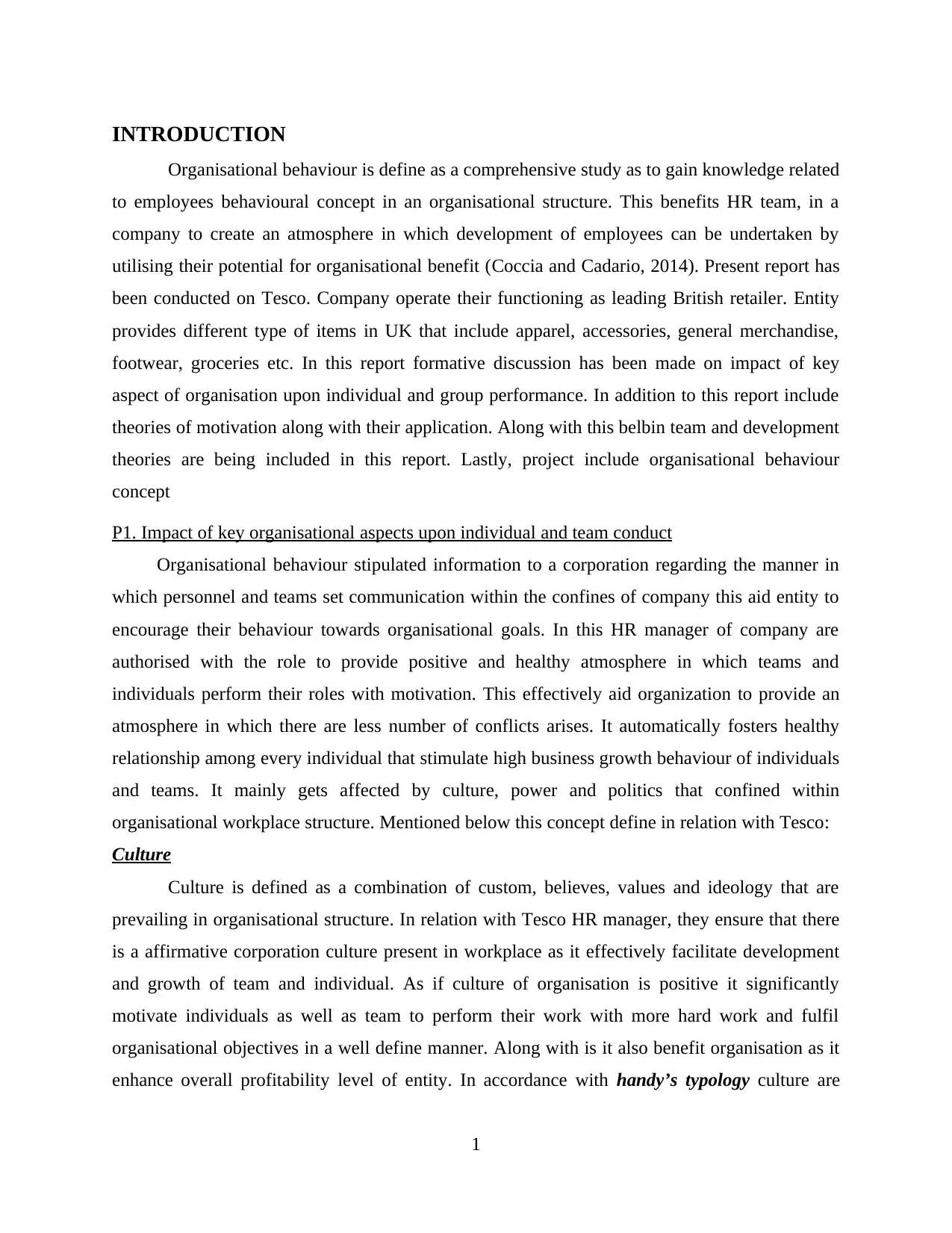
INTRODUCTION
Organisational behaviour is define as a comprehensive study as to gain knowledge related
to employees behavioural concept in an organisational structure. This benefits HR team, in a
company to create an atmosphere in which development of employees can be undertaken by
utilising their potential for organisational benefit (Coccia and Cadario, 2014). Present report has
been conducted on Tesco. Company operate their functioning as leading British retailer. Entity
provides different type of items in UK that include apparel, accessories, general merchandise,
footwear, groceries etc. In this report formative discussion has been made on impact of key
aspect of organisation upon individual and group performance. In addition to this report include
theories of motivation along with their application. Along with this belbin team and development
theories are being included in this report. Lastly, project include organisational behaviour
concept
P1. Impact of key organisational aspects upon individual and team conduct
Organisational behaviour stipulated information to a corporation regarding the manner in
which personnel and teams set communication within the confines of company this aid entity to
encourage their behaviour towards organisational goals. In this HR manager of company are
authorised with the role to provide positive and healthy atmosphere in which teams and
individuals perform their roles with motivation. This effectively aid organization to provide an
atmosphere in which there are less number of conflicts arises. It automatically fosters healthy
relationship among every individual that stimulate high business growth behaviour of individuals
and teams. It mainly gets affected by culture, power and politics that confined within
organisational workplace structure. Mentioned below this concept define in relation with Tesco:
Culture
Culture is defined as a combination of custom, believes, values and ideology that are
prevailing in organisational structure. In relation with Tesco HR manager, they ensure that there
is a affirmative corporation culture present in workplace as it effectively facilitate development
and growth of team and individual. As if culture of organisation is positive it significantly
motivate individuals as well as team to perform their work with more hard work and fulfil
organisational objectives in a well define manner. Along with is it also benefit organisation as it
enhance overall profitability level of entity. In accordance with handy’s typology culture are
1
Organisational behaviour is define as a comprehensive study as to gain knowledge related
to employees behavioural concept in an organisational structure. This benefits HR team, in a
company to create an atmosphere in which development of employees can be undertaken by
utilising their potential for organisational benefit (Coccia and Cadario, 2014). Present report has
been conducted on Tesco. Company operate their functioning as leading British retailer. Entity
provides different type of items in UK that include apparel, accessories, general merchandise,
footwear, groceries etc. In this report formative discussion has been made on impact of key
aspect of organisation upon individual and group performance. In addition to this report include
theories of motivation along with their application. Along with this belbin team and development
theories are being included in this report. Lastly, project include organisational behaviour
concept
P1. Impact of key organisational aspects upon individual and team conduct
Organisational behaviour stipulated information to a corporation regarding the manner in
which personnel and teams set communication within the confines of company this aid entity to
encourage their behaviour towards organisational goals. In this HR manager of company are
authorised with the role to provide positive and healthy atmosphere in which teams and
individuals perform their roles with motivation. This effectively aid organization to provide an
atmosphere in which there are less number of conflicts arises. It automatically fosters healthy
relationship among every individual that stimulate high business growth behaviour of individuals
and teams. It mainly gets affected by culture, power and politics that confined within
organisational workplace structure. Mentioned below this concept define in relation with Tesco:
Culture
Culture is defined as a combination of custom, believes, values and ideology that are
prevailing in organisational structure. In relation with Tesco HR manager, they ensure that there
is a affirmative corporation culture present in workplace as it effectively facilitate development
and growth of team and individual. As if culture of organisation is positive it significantly
motivate individuals as well as team to perform their work with more hard work and fulfil
organisational objectives in a well define manner. Along with is it also benefit organisation as it
enhance overall profitability level of entity. In accordance with handy’s typology culture are
1
Secure Best Marks with AI Grader
Need help grading? Try our AI Grader for instant feedback on your assignments.
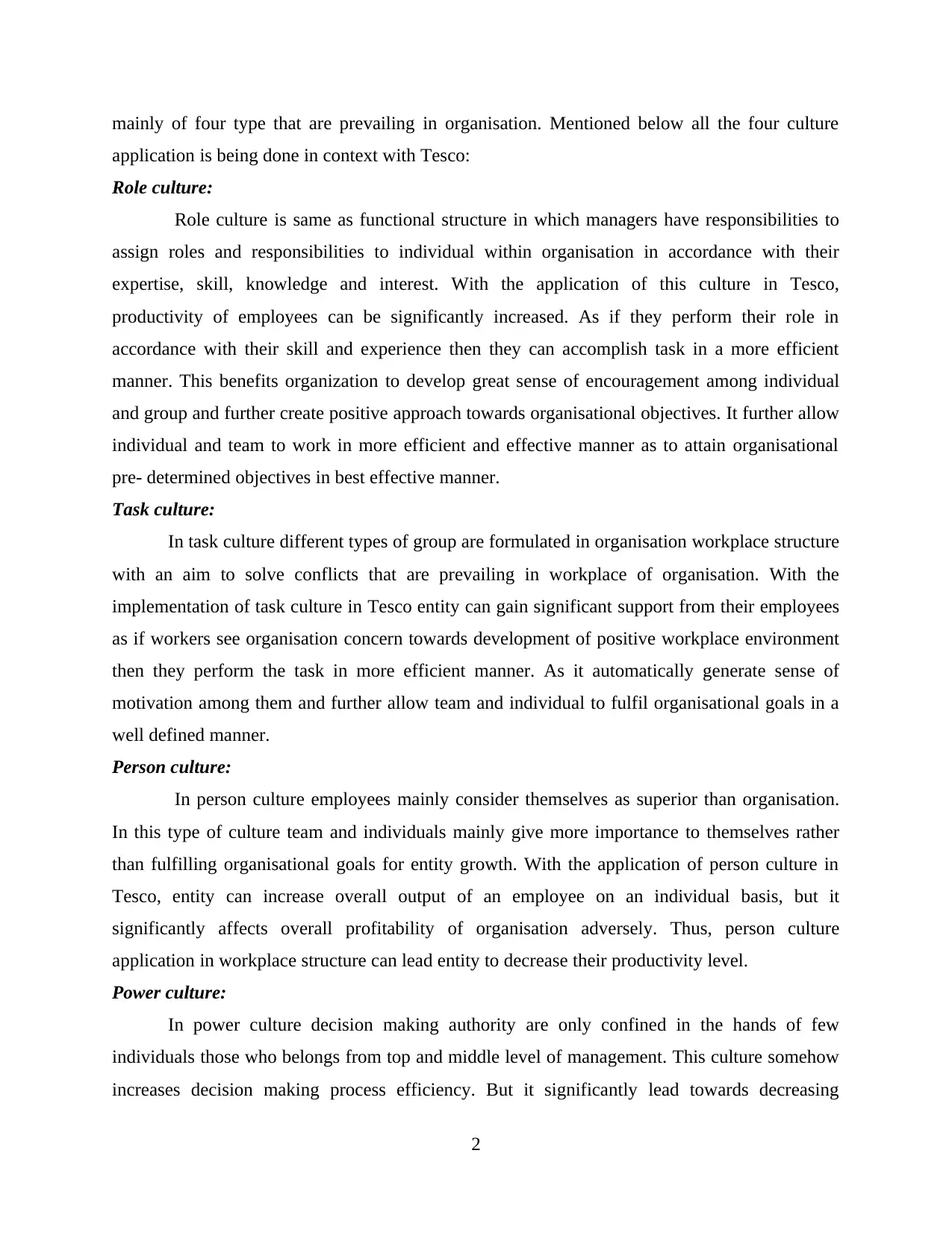
mainly of four type that are prevailing in organisation. Mentioned below all the four culture
application is being done in context with Tesco:
Role culture:
Role culture is same as functional structure in which managers have responsibilities to
assign roles and responsibilities to individual within organisation in accordance with their
expertise, skill, knowledge and interest. With the application of this culture in Tesco,
productivity of employees can be significantly increased. As if they perform their role in
accordance with their skill and experience then they can accomplish task in a more efficient
manner. This benefits organization to develop great sense of encouragement among individual
and group and further create positive approach towards organisational objectives. It further allow
individual and team to work in more efficient and effective manner as to attain organisational
pre- determined objectives in best effective manner.
Task culture:
In task culture different types of group are formulated in organisation workplace structure
with an aim to solve conflicts that are prevailing in workplace of organisation. With the
implementation of task culture in Tesco entity can gain significant support from their employees
as if workers see organisation concern towards development of positive workplace environment
then they perform the task in more efficient manner. As it automatically generate sense of
motivation among them and further allow team and individual to fulfil organisational goals in a
well defined manner.
Person culture:
In person culture employees mainly consider themselves as superior than organisation.
In this type of culture team and individuals mainly give more importance to themselves rather
than fulfilling organisational goals for entity growth. With the application of person culture in
Tesco, entity can increase overall output of an employee on an individual basis, but it
significantly affects overall profitability of organisation adversely. Thus, person culture
application in workplace structure can lead entity to decrease their productivity level.
Power culture:
In power culture decision making authority are only confined in the hands of few
individuals those who belongs from top and middle level of management. This culture somehow
increases decision making process efficiency. But it significantly lead towards decreasing
2
application is being done in context with Tesco:
Role culture:
Role culture is same as functional structure in which managers have responsibilities to
assign roles and responsibilities to individual within organisation in accordance with their
expertise, skill, knowledge and interest. With the application of this culture in Tesco,
productivity of employees can be significantly increased. As if they perform their role in
accordance with their skill and experience then they can accomplish task in a more efficient
manner. This benefits organization to develop great sense of encouragement among individual
and group and further create positive approach towards organisational objectives. It further allow
individual and team to work in more efficient and effective manner as to attain organisational
pre- determined objectives in best effective manner.
Task culture:
In task culture different types of group are formulated in organisation workplace structure
with an aim to solve conflicts that are prevailing in workplace of organisation. With the
implementation of task culture in Tesco entity can gain significant support from their employees
as if workers see organisation concern towards development of positive workplace environment
then they perform the task in more efficient manner. As it automatically generate sense of
motivation among them and further allow team and individual to fulfil organisational goals in a
well defined manner.
Person culture:
In person culture employees mainly consider themselves as superior than organisation.
In this type of culture team and individuals mainly give more importance to themselves rather
than fulfilling organisational goals for entity growth. With the application of person culture in
Tesco, entity can increase overall output of an employee on an individual basis, but it
significantly affects overall profitability of organisation adversely. Thus, person culture
application in workplace structure can lead entity to decrease their productivity level.
Power culture:
In power culture decision making authority are only confined in the hands of few
individuals those who belongs from top and middle level of management. This culture somehow
increases decision making process efficiency. But it significantly lead towards decreasing
2
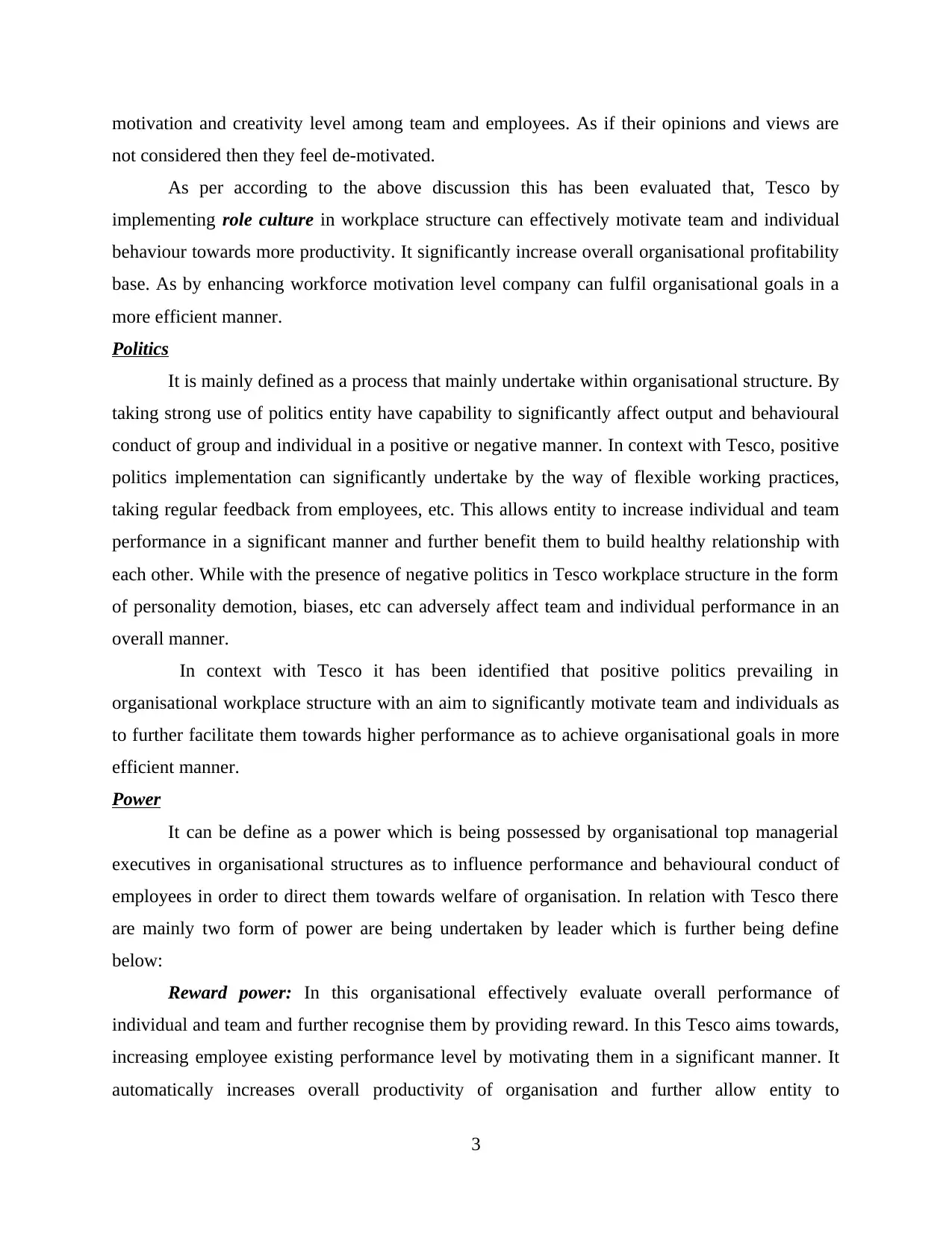
motivation and creativity level among team and employees. As if their opinions and views are
not considered then they feel de-motivated.
As per according to the above discussion this has been evaluated that, Tesco by
implementing role culture in workplace structure can effectively motivate team and individual
behaviour towards more productivity. It significantly increase overall organisational profitability
base. As by enhancing workforce motivation level company can fulfil organisational goals in a
more efficient manner.
Politics
It is mainly defined as a process that mainly undertake within organisational structure. By
taking strong use of politics entity have capability to significantly affect output and behavioural
conduct of group and individual in a positive or negative manner. In context with Tesco, positive
politics implementation can significantly undertake by the way of flexible working practices,
taking regular feedback from employees, etc. This allows entity to increase individual and team
performance in a significant manner and further benefit them to build healthy relationship with
each other. While with the presence of negative politics in Tesco workplace structure in the form
of personality demotion, biases, etc can adversely affect team and individual performance in an
overall manner.
In context with Tesco it has been identified that positive politics prevailing in
organisational workplace structure with an aim to significantly motivate team and individuals as
to further facilitate them towards higher performance as to achieve organisational goals in more
efficient manner.
Power
It can be define as a power which is being possessed by organisational top managerial
executives in organisational structures as to influence performance and behavioural conduct of
employees in order to direct them towards welfare of organisation. In relation with Tesco there
are mainly two form of power are being undertaken by leader which is further being define
below:
Reward power: In this organisational effectively evaluate overall performance of
individual and team and further recognise them by providing reward. In this Tesco aims towards,
increasing employee existing performance level by motivating them in a significant manner. It
automatically increases overall productivity of organisation and further allow entity to
3
not considered then they feel de-motivated.
As per according to the above discussion this has been evaluated that, Tesco by
implementing role culture in workplace structure can effectively motivate team and individual
behaviour towards more productivity. It significantly increase overall organisational profitability
base. As by enhancing workforce motivation level company can fulfil organisational goals in a
more efficient manner.
Politics
It is mainly defined as a process that mainly undertake within organisational structure. By
taking strong use of politics entity have capability to significantly affect output and behavioural
conduct of group and individual in a positive or negative manner. In context with Tesco, positive
politics implementation can significantly undertake by the way of flexible working practices,
taking regular feedback from employees, etc. This allows entity to increase individual and team
performance in a significant manner and further benefit them to build healthy relationship with
each other. While with the presence of negative politics in Tesco workplace structure in the form
of personality demotion, biases, etc can adversely affect team and individual performance in an
overall manner.
In context with Tesco it has been identified that positive politics prevailing in
organisational workplace structure with an aim to significantly motivate team and individuals as
to further facilitate them towards higher performance as to achieve organisational goals in more
efficient manner.
Power
It can be define as a power which is being possessed by organisational top managerial
executives in organisational structures as to influence performance and behavioural conduct of
employees in order to direct them towards welfare of organisation. In relation with Tesco there
are mainly two form of power are being undertaken by leader which is further being define
below:
Reward power: In this organisational effectively evaluate overall performance of
individual and team and further recognise them by providing reward. In this Tesco aims towards,
increasing employee existing performance level by motivating them in a significant manner. It
automatically increases overall productivity of organisation and further allow entity to
3
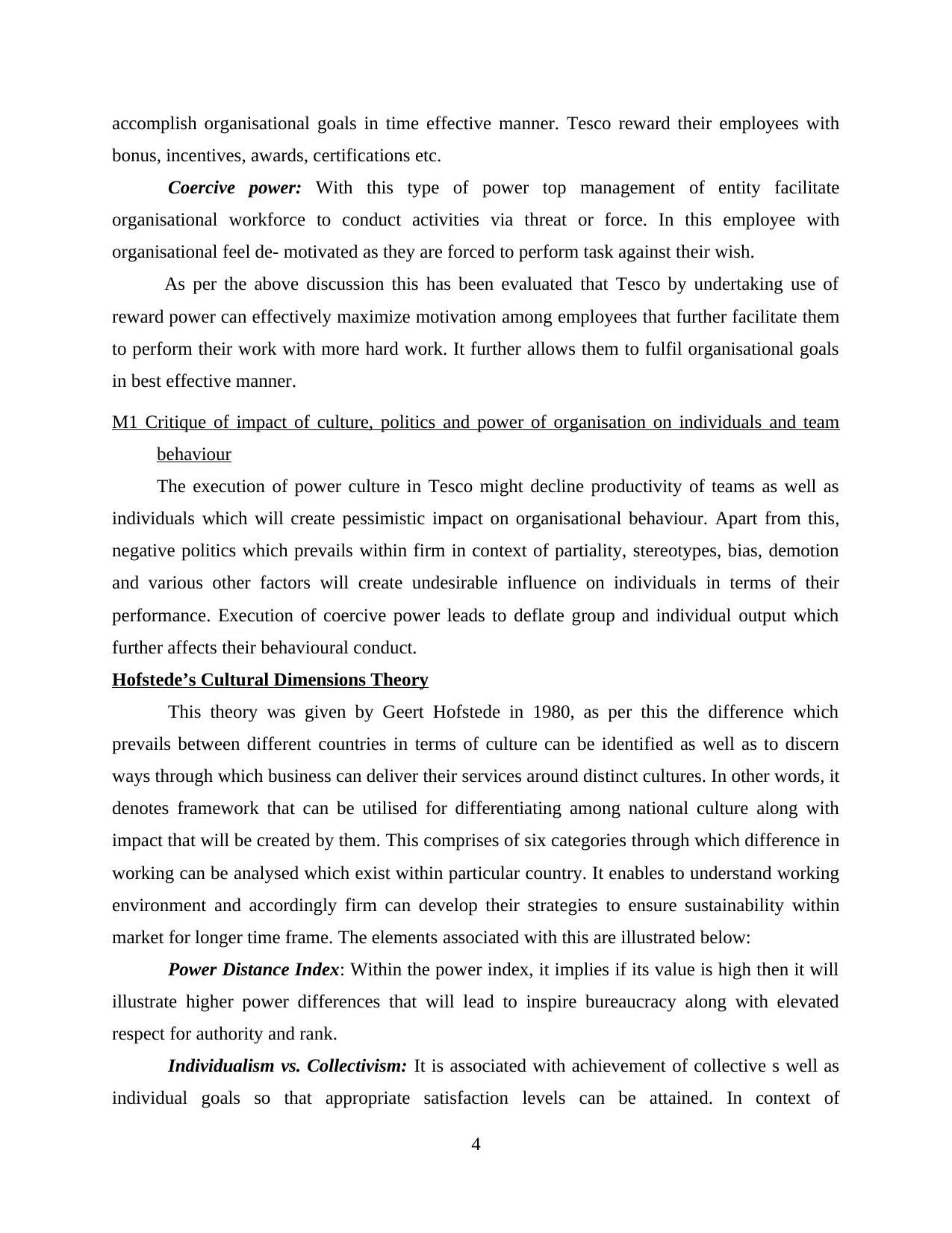
accomplish organisational goals in time effective manner. Tesco reward their employees with
bonus, incentives, awards, certifications etc.
Coercive power: With this type of power top management of entity facilitate
organisational workforce to conduct activities via threat or force. In this employee with
organisational feel de- motivated as they are forced to perform task against their wish.
As per the above discussion this has been evaluated that Tesco by undertaking use of
reward power can effectively maximize motivation among employees that further facilitate them
to perform their work with more hard work. It further allows them to fulfil organisational goals
in best effective manner.
M1 Critique of impact of culture, politics and power of organisation on individuals and team
behaviour
The execution of power culture in Tesco might decline productivity of teams as well as
individuals which will create pessimistic impact on organisational behaviour. Apart from this,
negative politics which prevails within firm in context of partiality, stereotypes, bias, demotion
and various other factors will create undesirable influence on individuals in terms of their
performance. Execution of coercive power leads to deflate group and individual output which
further affects their behavioural conduct.
Hofstede’s Cultural Dimensions Theory
This theory was given by Geert Hofstede in 1980, as per this the difference which
prevails between different countries in terms of culture can be identified as well as to discern
ways through which business can deliver their services around distinct cultures. In other words, it
denotes framework that can be utilised for differentiating among national culture along with
impact that will be created by them. This comprises of six categories through which difference in
working can be analysed which exist within particular country. It enables to understand working
environment and accordingly firm can develop their strategies to ensure sustainability within
market for longer time frame. The elements associated with this are illustrated below:
Power Distance Index: Within the power index, it implies if its value is high then it will
illustrate higher power differences that will lead to inspire bureaucracy along with elevated
respect for authority and rank.
Individualism vs. Collectivism: It is associated with achievement of collective s well as
individual goals so that appropriate satisfaction levels can be attained. In context of
4
bonus, incentives, awards, certifications etc.
Coercive power: With this type of power top management of entity facilitate
organisational workforce to conduct activities via threat or force. In this employee with
organisational feel de- motivated as they are forced to perform task against their wish.
As per the above discussion this has been evaluated that Tesco by undertaking use of
reward power can effectively maximize motivation among employees that further facilitate them
to perform their work with more hard work. It further allows them to fulfil organisational goals
in best effective manner.
M1 Critique of impact of culture, politics and power of organisation on individuals and team
behaviour
The execution of power culture in Tesco might decline productivity of teams as well as
individuals which will create pessimistic impact on organisational behaviour. Apart from this,
negative politics which prevails within firm in context of partiality, stereotypes, bias, demotion
and various other factors will create undesirable influence on individuals in terms of their
performance. Execution of coercive power leads to deflate group and individual output which
further affects their behavioural conduct.
Hofstede’s Cultural Dimensions Theory
This theory was given by Geert Hofstede in 1980, as per this the difference which
prevails between different countries in terms of culture can be identified as well as to discern
ways through which business can deliver their services around distinct cultures. In other words, it
denotes framework that can be utilised for differentiating among national culture along with
impact that will be created by them. This comprises of six categories through which difference in
working can be analysed which exist within particular country. It enables to understand working
environment and accordingly firm can develop their strategies to ensure sustainability within
market for longer time frame. The elements associated with this are illustrated below:
Power Distance Index: Within the power index, it implies if its value is high then it will
illustrate higher power differences that will lead to inspire bureaucracy along with elevated
respect for authority and rank.
Individualism vs. Collectivism: It is associated with achievement of collective s well as
individual goals so that appropriate satisfaction levels can be attained. In context of
4
Paraphrase This Document
Need a fresh take? Get an instant paraphrase of this document with our AI Paraphraser
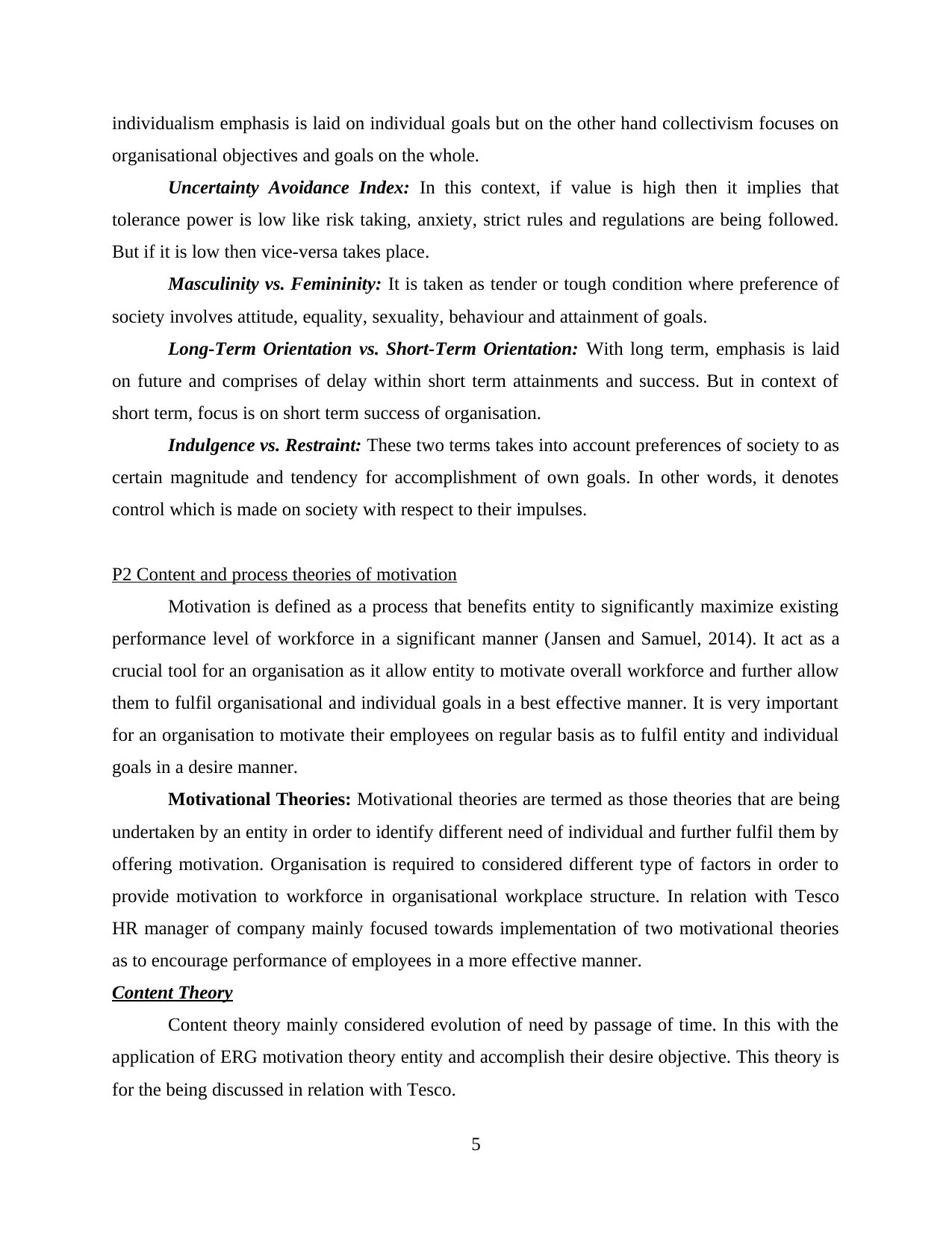
individualism emphasis is laid on individual goals but on the other hand collectivism focuses on
organisational objectives and goals on the whole.
Uncertainty Avoidance Index: In this context, if value is high then it implies that
tolerance power is low like risk taking, anxiety, strict rules and regulations are being followed.
But if it is low then vice-versa takes place.
Masculinity vs. Femininity: It is taken as tender or tough condition where preference of
society involves attitude, equality, sexuality, behaviour and attainment of goals.
Long-Term Orientation vs. Short-Term Orientation: With long term, emphasis is laid
on future and comprises of delay within short term attainments and success. But in context of
short term, focus is on short term success of organisation.
Indulgence vs. Restraint: These two terms takes into account preferences of society to as
certain magnitude and tendency for accomplishment of own goals. In other words, it denotes
control which is made on society with respect to their impulses.
P2 Content and process theories of motivation
Motivation is defined as a process that benefits entity to significantly maximize existing
performance level of workforce in a significant manner (Jansen and Samuel, 2014). It act as a
crucial tool for an organisation as it allow entity to motivate overall workforce and further allow
them to fulfil organisational and individual goals in a best effective manner. It is very important
for an organisation to motivate their employees on regular basis as to fulfil entity and individual
goals in a desire manner.
Motivational Theories: Motivational theories are termed as those theories that are being
undertaken by an entity in order to identify different need of individual and further fulfil them by
offering motivation. Organisation is required to considered different type of factors in order to
provide motivation to workforce in organisational workplace structure. In relation with Tesco
HR manager of company mainly focused towards implementation of two motivational theories
as to encourage performance of employees in a more effective manner.
Content Theory
Content theory mainly considered evolution of need by passage of time. In this with the
application of ERG motivation theory entity and accomplish their desire objective. This theory is
for the being discussed in relation with Tesco.
5
organisational objectives and goals on the whole.
Uncertainty Avoidance Index: In this context, if value is high then it implies that
tolerance power is low like risk taking, anxiety, strict rules and regulations are being followed.
But if it is low then vice-versa takes place.
Masculinity vs. Femininity: It is taken as tender or tough condition where preference of
society involves attitude, equality, sexuality, behaviour and attainment of goals.
Long-Term Orientation vs. Short-Term Orientation: With long term, emphasis is laid
on future and comprises of delay within short term attainments and success. But in context of
short term, focus is on short term success of organisation.
Indulgence vs. Restraint: These two terms takes into account preferences of society to as
certain magnitude and tendency for accomplishment of own goals. In other words, it denotes
control which is made on society with respect to their impulses.
P2 Content and process theories of motivation
Motivation is defined as a process that benefits entity to significantly maximize existing
performance level of workforce in a significant manner (Jansen and Samuel, 2014). It act as a
crucial tool for an organisation as it allow entity to motivate overall workforce and further allow
them to fulfil organisational and individual goals in a best effective manner. It is very important
for an organisation to motivate their employees on regular basis as to fulfil entity and individual
goals in a desire manner.
Motivational Theories: Motivational theories are termed as those theories that are being
undertaken by an entity in order to identify different need of individual and further fulfil them by
offering motivation. Organisation is required to considered different type of factors in order to
provide motivation to workforce in organisational workplace structure. In relation with Tesco
HR manager of company mainly focused towards implementation of two motivational theories
as to encourage performance of employees in a more effective manner.
Content Theory
Content theory mainly considered evolution of need by passage of time. In this with the
application of ERG motivation theory entity and accomplish their desire objective. This theory is
for the being discussed in relation with Tesco.
5
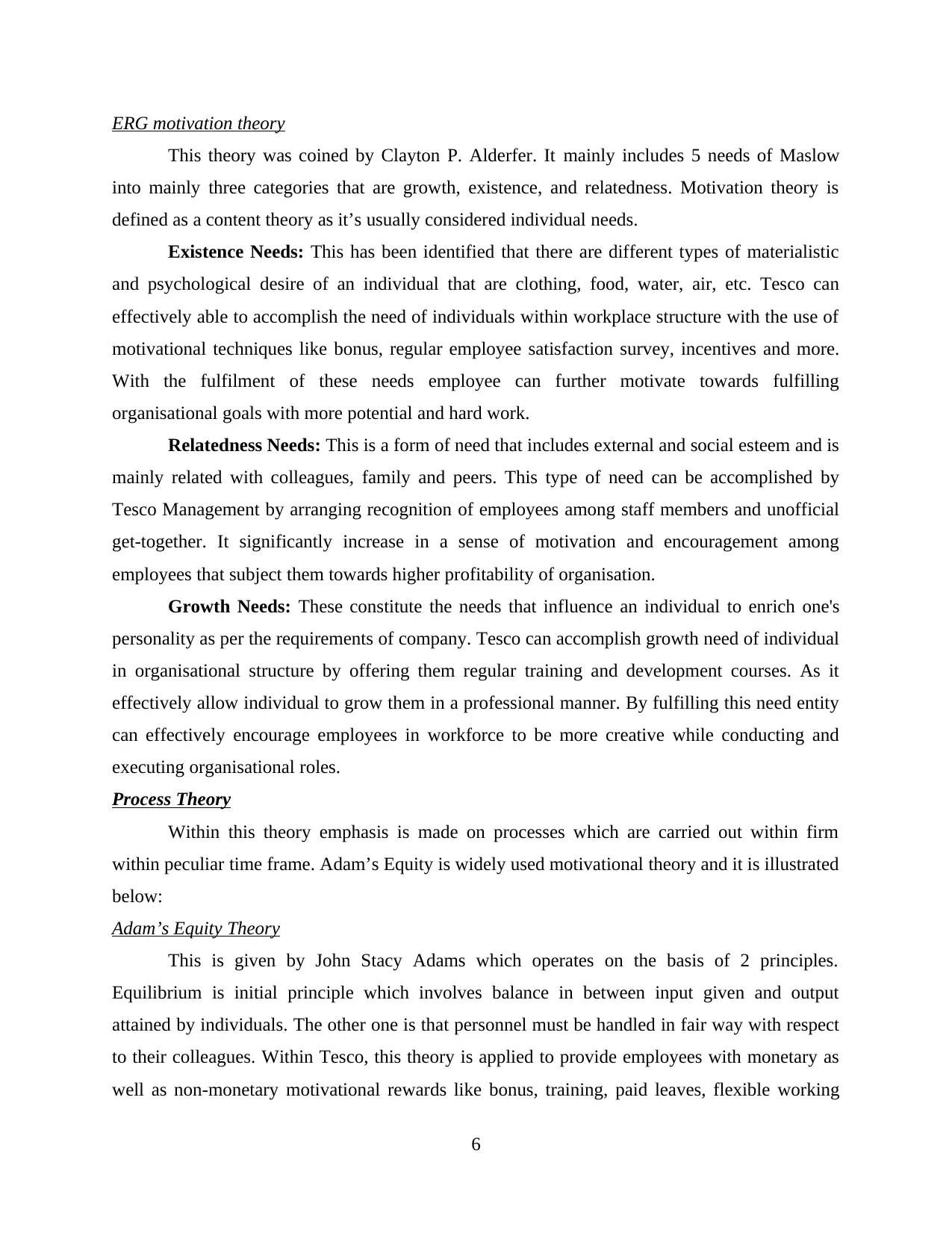
ERG motivation theory
This theory was coined by Clayton P. Alderfer. It mainly includes 5 needs of Maslow
into mainly three categories that are growth, existence, and relatedness. Motivation theory is
defined as a content theory as it’s usually considered individual needs.
Existence Needs: This has been identified that there are different types of materialistic
and psychological desire of an individual that are clothing, food, water, air, etc. Tesco can
effectively able to accomplish the need of individuals within workplace structure with the use of
motivational techniques like bonus, regular employee satisfaction survey, incentives and more.
With the fulfilment of these needs employee can further motivate towards fulfilling
organisational goals with more potential and hard work.
Relatedness Needs: This is a form of need that includes external and social esteem and is
mainly related with colleagues, family and peers. This type of need can be accomplished by
Tesco Management by arranging recognition of employees among staff members and unofficial
get-together. It significantly increase in a sense of motivation and encouragement among
employees that subject them towards higher profitability of organisation.
Growth Needs: These constitute the needs that influence an individual to enrich one's
personality as per the requirements of company. Tesco can accomplish growth need of individual
in organisational structure by offering them regular training and development courses. As it
effectively allow individual to grow them in a professional manner. By fulfilling this need entity
can effectively encourage employees in workforce to be more creative while conducting and
executing organisational roles.
Process Theory
Within this theory emphasis is made on processes which are carried out within firm
within peculiar time frame. Adam’s Equity is widely used motivational theory and it is illustrated
below:
Adam’s Equity Theory
This is given by John Stacy Adams which operates on the basis of 2 principles.
Equilibrium is initial principle which involves balance in between input given and output
attained by individuals. The other one is that personnel must be handled in fair way with respect
to their colleagues. Within Tesco, this theory is applied to provide employees with monetary as
well as non-monetary motivational rewards like bonus, training, paid leaves, flexible working
6
This theory was coined by Clayton P. Alderfer. It mainly includes 5 needs of Maslow
into mainly three categories that are growth, existence, and relatedness. Motivation theory is
defined as a content theory as it’s usually considered individual needs.
Existence Needs: This has been identified that there are different types of materialistic
and psychological desire of an individual that are clothing, food, water, air, etc. Tesco can
effectively able to accomplish the need of individuals within workplace structure with the use of
motivational techniques like bonus, regular employee satisfaction survey, incentives and more.
With the fulfilment of these needs employee can further motivate towards fulfilling
organisational goals with more potential and hard work.
Relatedness Needs: This is a form of need that includes external and social esteem and is
mainly related with colleagues, family and peers. This type of need can be accomplished by
Tesco Management by arranging recognition of employees among staff members and unofficial
get-together. It significantly increase in a sense of motivation and encouragement among
employees that subject them towards higher profitability of organisation.
Growth Needs: These constitute the needs that influence an individual to enrich one's
personality as per the requirements of company. Tesco can accomplish growth need of individual
in organisational structure by offering them regular training and development courses. As it
effectively allow individual to grow them in a professional manner. By fulfilling this need entity
can effectively encourage employees in workforce to be more creative while conducting and
executing organisational roles.
Process Theory
Within this theory emphasis is made on processes which are carried out within firm
within peculiar time frame. Adam’s Equity is widely used motivational theory and it is illustrated
below:
Adam’s Equity Theory
This is given by John Stacy Adams which operates on the basis of 2 principles.
Equilibrium is initial principle which involves balance in between input given and output
attained by individuals. The other one is that personnel must be handled in fair way with respect
to their colleagues. Within Tesco, this theory is applied to provide employees with monetary as
well as non-monetary motivational rewards like bonus, training, paid leaves, flexible working
6
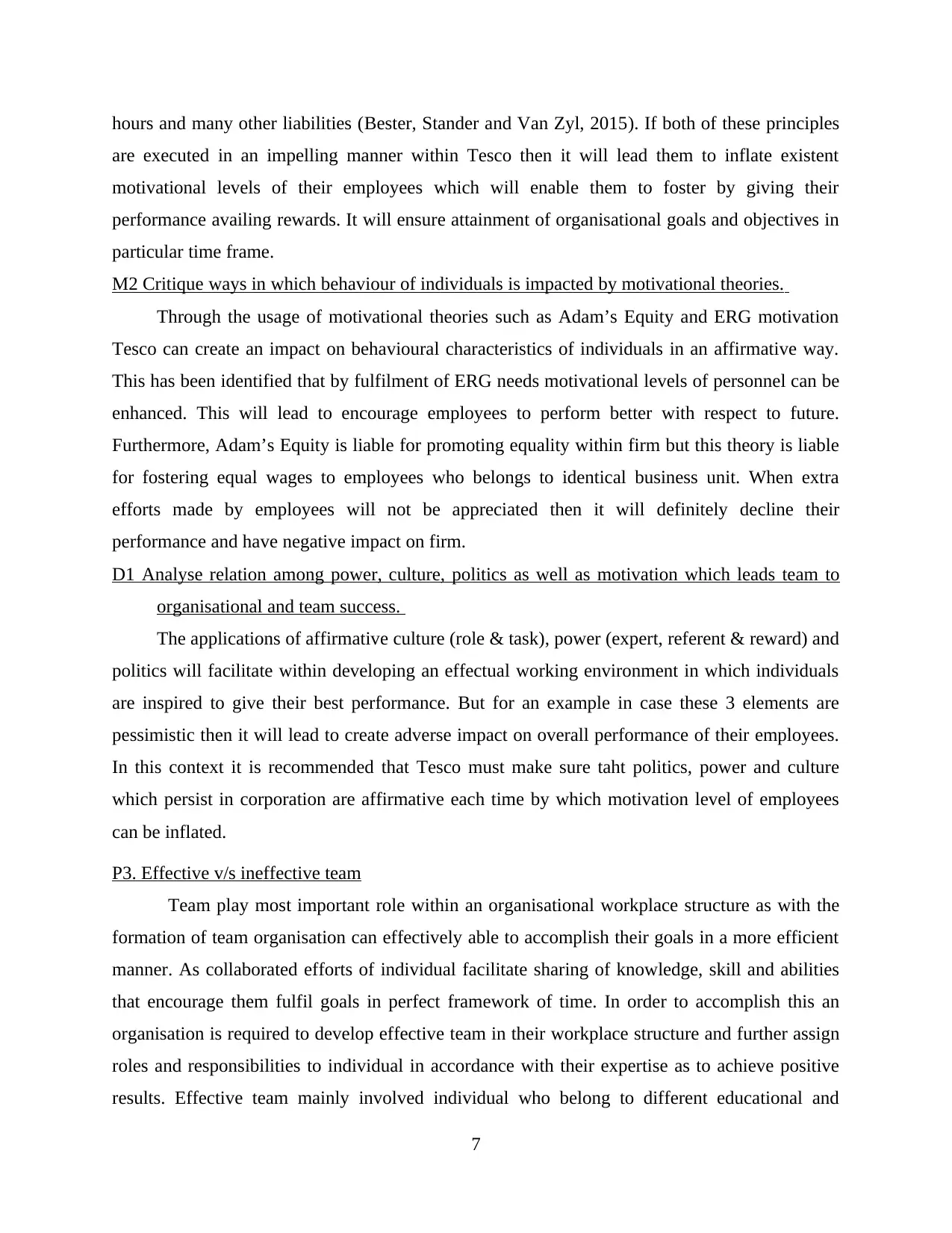
hours and many other liabilities (Bester, Stander and Van Zyl, 2015). If both of these principles
are executed in an impelling manner within Tesco then it will lead them to inflate existent
motivational levels of their employees which will enable them to foster by giving their
performance availing rewards. It will ensure attainment of organisational goals and objectives in
particular time frame.
M2 Critique ways in which behaviour of individuals is impacted by motivational theories.
Through the usage of motivational theories such as Adam’s Equity and ERG motivation
Tesco can create an impact on behavioural characteristics of individuals in an affirmative way.
This has been identified that by fulfilment of ERG needs motivational levels of personnel can be
enhanced. This will lead to encourage employees to perform better with respect to future.
Furthermore, Adam’s Equity is liable for promoting equality within firm but this theory is liable
for fostering equal wages to employees who belongs to identical business unit. When extra
efforts made by employees will not be appreciated then it will definitely decline their
performance and have negative impact on firm.
D1 Analyse relation among power, culture, politics as well as motivation which leads team to
organisational and team success.
The applications of affirmative culture (role & task), power (expert, referent & reward) and
politics will facilitate within developing an effectual working environment in which individuals
are inspired to give their best performance. But for an example in case these 3 elements are
pessimistic then it will lead to create adverse impact on overall performance of their employees.
In this context it is recommended that Tesco must make sure taht politics, power and culture
which persist in corporation are affirmative each time by which motivation level of employees
can be inflated.
P3. Effective v/s ineffective team
Team play most important role within an organisational workplace structure as with the
formation of team organisation can effectively able to accomplish their goals in a more efficient
manner. As collaborated efforts of individual facilitate sharing of knowledge, skill and abilities
that encourage them fulfil goals in perfect framework of time. In order to accomplish this an
organisation is required to develop effective team in their workplace structure and further assign
roles and responsibilities to individual in accordance with their expertise as to achieve positive
results. Effective team mainly involved individual who belong to different educational and
7
are executed in an impelling manner within Tesco then it will lead them to inflate existent
motivational levels of their employees which will enable them to foster by giving their
performance availing rewards. It will ensure attainment of organisational goals and objectives in
particular time frame.
M2 Critique ways in which behaviour of individuals is impacted by motivational theories.
Through the usage of motivational theories such as Adam’s Equity and ERG motivation
Tesco can create an impact on behavioural characteristics of individuals in an affirmative way.
This has been identified that by fulfilment of ERG needs motivational levels of personnel can be
enhanced. This will lead to encourage employees to perform better with respect to future.
Furthermore, Adam’s Equity is liable for promoting equality within firm but this theory is liable
for fostering equal wages to employees who belongs to identical business unit. When extra
efforts made by employees will not be appreciated then it will definitely decline their
performance and have negative impact on firm.
D1 Analyse relation among power, culture, politics as well as motivation which leads team to
organisational and team success.
The applications of affirmative culture (role & task), power (expert, referent & reward) and
politics will facilitate within developing an effectual working environment in which individuals
are inspired to give their best performance. But for an example in case these 3 elements are
pessimistic then it will lead to create adverse impact on overall performance of their employees.
In this context it is recommended that Tesco must make sure taht politics, power and culture
which persist in corporation are affirmative each time by which motivation level of employees
can be inflated.
P3. Effective v/s ineffective team
Team play most important role within an organisational workplace structure as with the
formation of team organisation can effectively able to accomplish their goals in a more efficient
manner. As collaborated efforts of individual facilitate sharing of knowledge, skill and abilities
that encourage them fulfil goals in perfect framework of time. In order to accomplish this an
organisation is required to develop effective team in their workplace structure and further assign
roles and responsibilities to individual in accordance with their expertise as to achieve positive
results. Effective team mainly involved individual who belong to different educational and
7
Secure Best Marks with AI Grader
Need help grading? Try our AI Grader for instant feedback on your assignments.
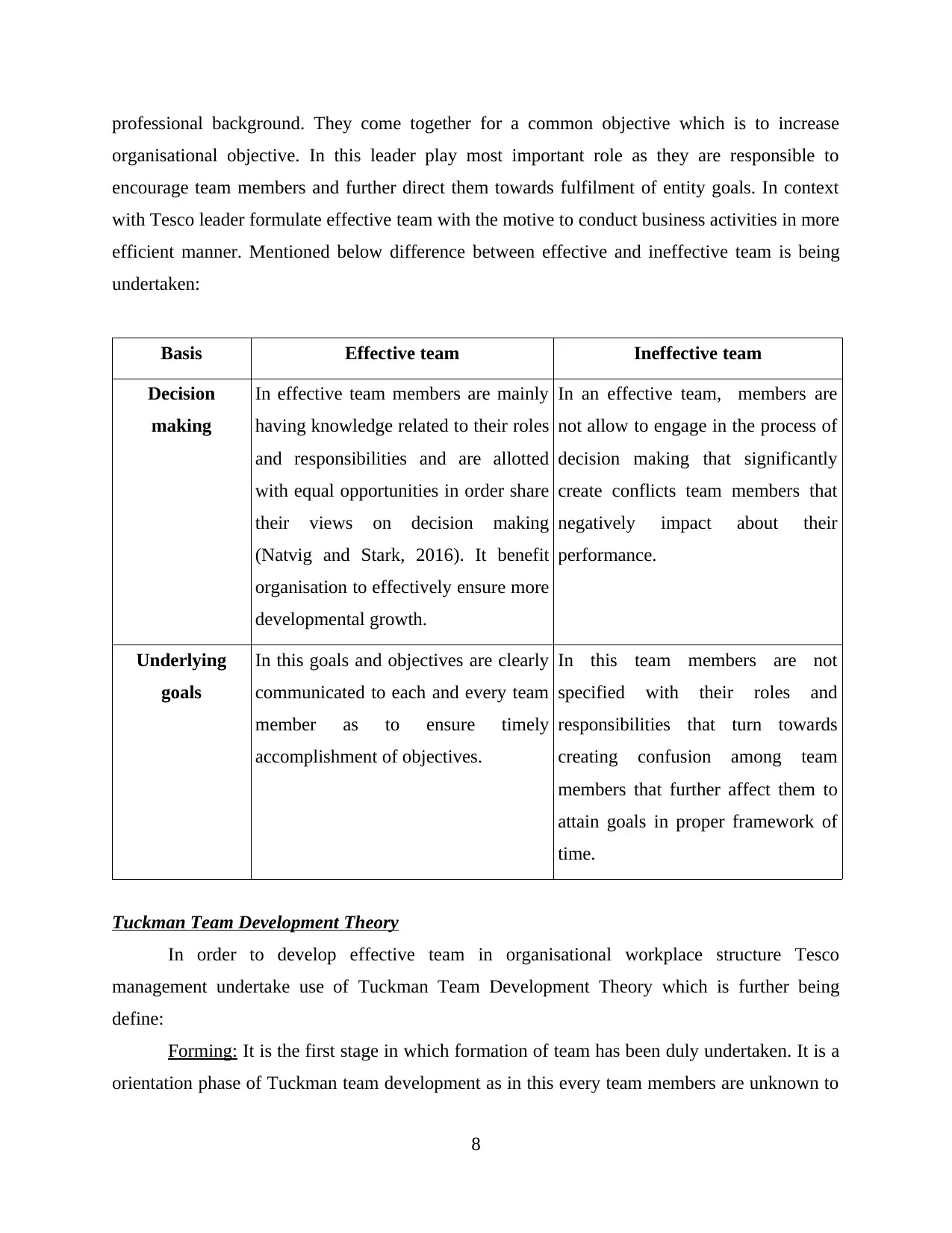
professional background. They come together for a common objective which is to increase
organisational objective. In this leader play most important role as they are responsible to
encourage team members and further direct them towards fulfilment of entity goals. In context
with Tesco leader formulate effective team with the motive to conduct business activities in more
efficient manner. Mentioned below difference between effective and ineffective team is being
undertaken:
Basis Effective team Ineffective team
Decision
making
In effective team members are mainly
having knowledge related to their roles
and responsibilities and are allotted
with equal opportunities in order share
their views on decision making
(Natvig and Stark, 2016). It benefit
organisation to effectively ensure more
developmental growth.
In an effective team, members are
not allow to engage in the process of
decision making that significantly
create conflicts team members that
negatively impact about their
performance.
Underlying
goals
In this goals and objectives are clearly
communicated to each and every team
member as to ensure timely
accomplishment of objectives.
In this team members are not
specified with their roles and
responsibilities that turn towards
creating confusion among team
members that further affect them to
attain goals in proper framework of
time.
Tuckman Team Development Theory
In order to develop effective team in organisational workplace structure Tesco
management undertake use of Tuckman Team Development Theory which is further being
define:
Forming: It is the first stage in which formation of team has been duly undertaken. It is a
orientation phase of Tuckman team development as in this every team members are unknown to
8
organisational objective. In this leader play most important role as they are responsible to
encourage team members and further direct them towards fulfilment of entity goals. In context
with Tesco leader formulate effective team with the motive to conduct business activities in more
efficient manner. Mentioned below difference between effective and ineffective team is being
undertaken:
Basis Effective team Ineffective team
Decision
making
In effective team members are mainly
having knowledge related to their roles
and responsibilities and are allotted
with equal opportunities in order share
their views on decision making
(Natvig and Stark, 2016). It benefit
organisation to effectively ensure more
developmental growth.
In an effective team, members are
not allow to engage in the process of
decision making that significantly
create conflicts team members that
negatively impact about their
performance.
Underlying
goals
In this goals and objectives are clearly
communicated to each and every team
member as to ensure timely
accomplishment of objectives.
In this team members are not
specified with their roles and
responsibilities that turn towards
creating confusion among team
members that further affect them to
attain goals in proper framework of
time.
Tuckman Team Development Theory
In order to develop effective team in organisational workplace structure Tesco
management undertake use of Tuckman Team Development Theory which is further being
define:
Forming: It is the first stage in which formation of team has been duly undertaken. It is a
orientation phase of Tuckman team development as in this every team members are unknown to
8
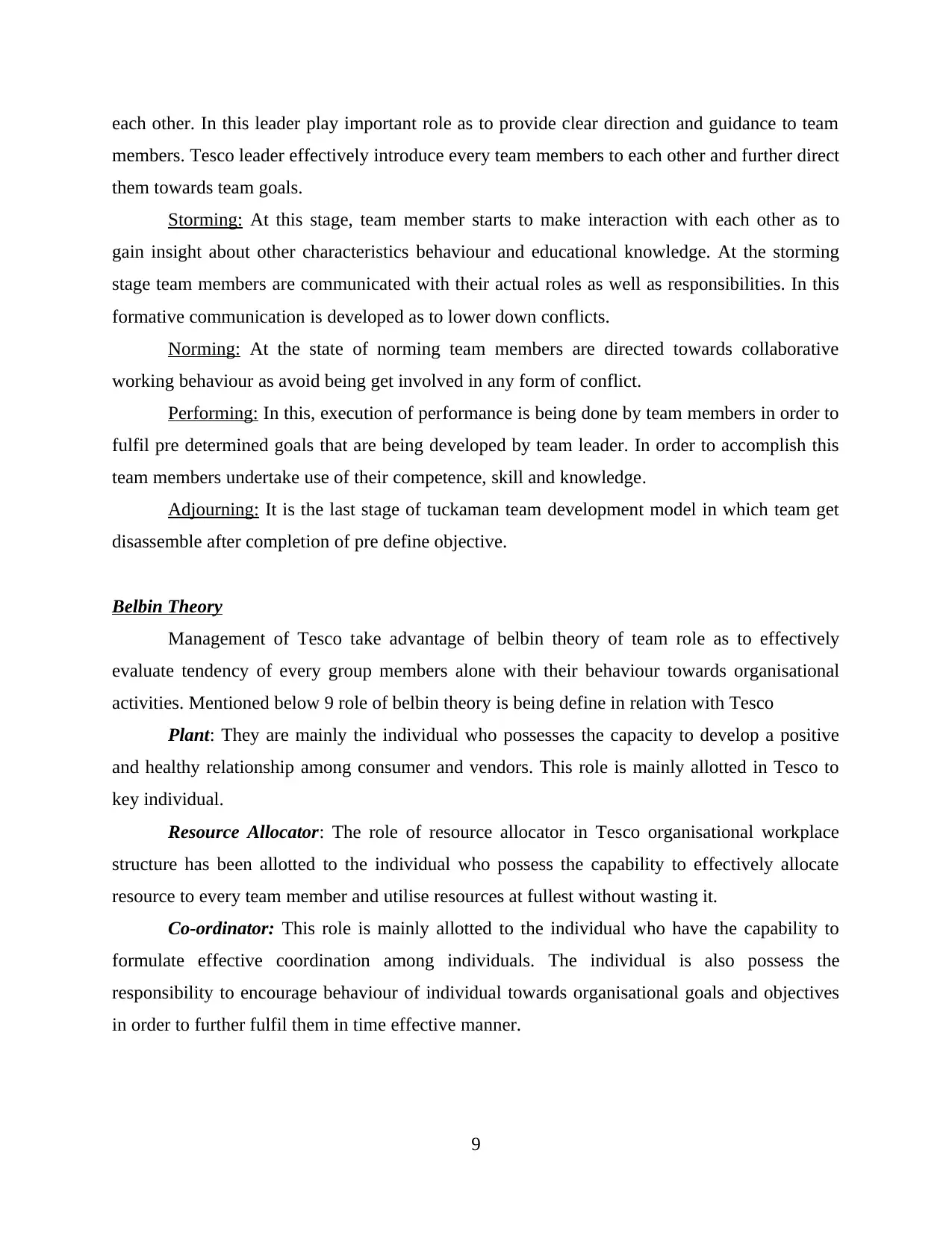
each other. In this leader play important role as to provide clear direction and guidance to team
members. Tesco leader effectively introduce every team members to each other and further direct
them towards team goals.
Storming: At this stage, team member starts to make interaction with each other as to
gain insight about other characteristics behaviour and educational knowledge. At the storming
stage team members are communicated with their actual roles as well as responsibilities. In this
formative communication is developed as to lower down conflicts.
Norming: At the state of norming team members are directed towards collaborative
working behaviour as avoid being get involved in any form of conflict.
Performing: In this, execution of performance is being done by team members in order to
fulfil pre determined goals that are being developed by team leader. In order to accomplish this
team members undertake use of their competence, skill and knowledge.
Adjourning: It is the last stage of tuckaman team development model in which team get
disassemble after completion of pre define objective.
Belbin Theory
Management of Tesco take advantage of belbin theory of team role as to effectively
evaluate tendency of every group members alone with their behaviour towards organisational
activities. Mentioned below 9 role of belbin theory is being define in relation with Tesco
Plant: They are mainly the individual who possesses the capacity to develop a positive
and healthy relationship among consumer and vendors. This role is mainly allotted in Tesco to
key individual.
Resource Allocator: The role of resource allocator in Tesco organisational workplace
structure has been allotted to the individual who possess the capability to effectively allocate
resource to every team member and utilise resources at fullest without wasting it.
Co-ordinator: This role is mainly allotted to the individual who have the capability to
formulate effective coordination among individuals. The individual is also possess the
responsibility to encourage behaviour of individual towards organisational goals and objectives
in order to further fulfil them in time effective manner.
9
members. Tesco leader effectively introduce every team members to each other and further direct
them towards team goals.
Storming: At this stage, team member starts to make interaction with each other as to
gain insight about other characteristics behaviour and educational knowledge. At the storming
stage team members are communicated with their actual roles as well as responsibilities. In this
formative communication is developed as to lower down conflicts.
Norming: At the state of norming team members are directed towards collaborative
working behaviour as avoid being get involved in any form of conflict.
Performing: In this, execution of performance is being done by team members in order to
fulfil pre determined goals that are being developed by team leader. In order to accomplish this
team members undertake use of their competence, skill and knowledge.
Adjourning: It is the last stage of tuckaman team development model in which team get
disassemble after completion of pre define objective.
Belbin Theory
Management of Tesco take advantage of belbin theory of team role as to effectively
evaluate tendency of every group members alone with their behaviour towards organisational
activities. Mentioned below 9 role of belbin theory is being define in relation with Tesco
Plant: They are mainly the individual who possesses the capacity to develop a positive
and healthy relationship among consumer and vendors. This role is mainly allotted in Tesco to
key individual.
Resource Allocator: The role of resource allocator in Tesco organisational workplace
structure has been allotted to the individual who possess the capability to effectively allocate
resource to every team member and utilise resources at fullest without wasting it.
Co-ordinator: This role is mainly allotted to the individual who have the capability to
formulate effective coordination among individuals. The individual is also possess the
responsibility to encourage behaviour of individual towards organisational goals and objectives
in order to further fulfil them in time effective manner.
9
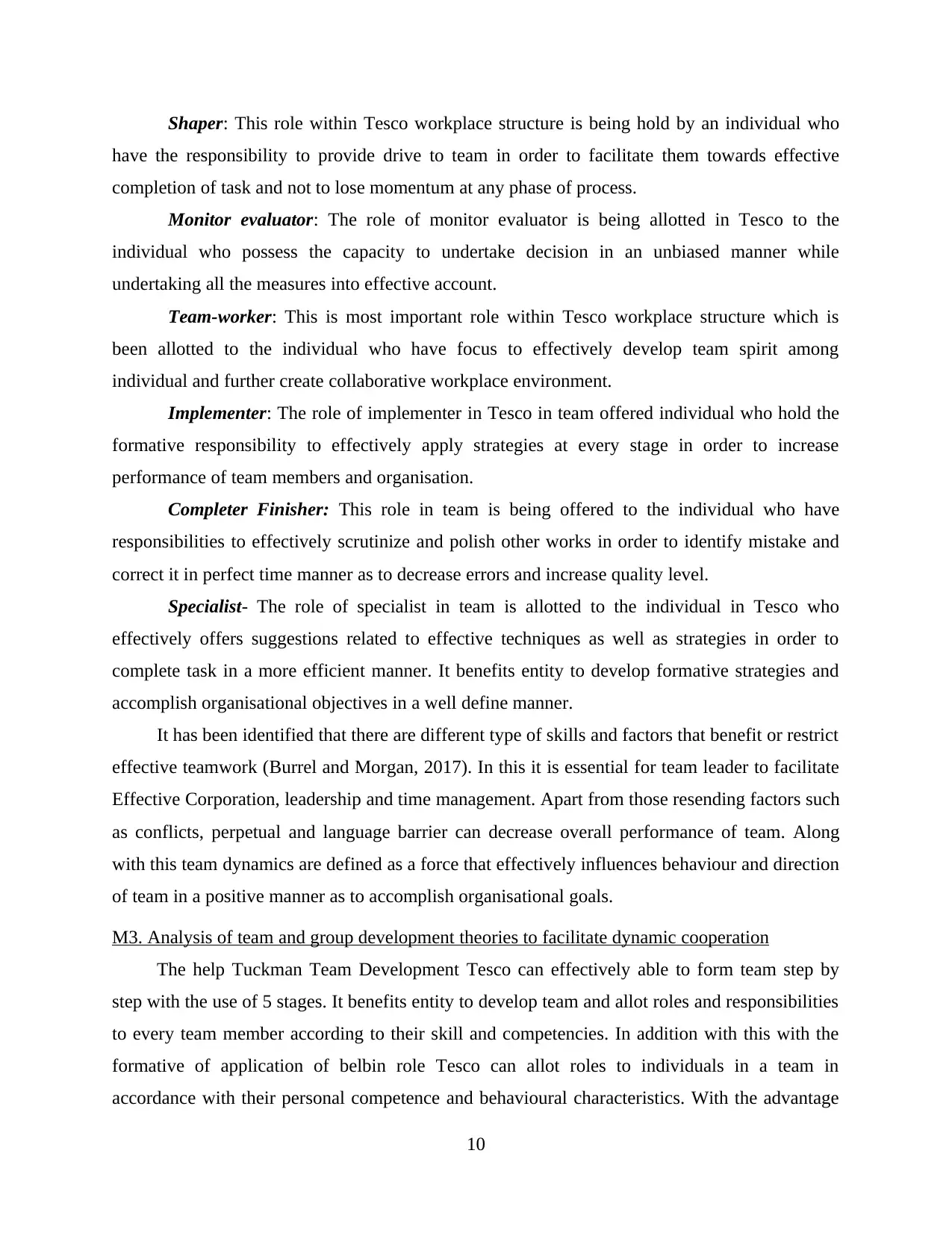
Shaper: This role within Tesco workplace structure is being hold by an individual who
have the responsibility to provide drive to team in order to facilitate them towards effective
completion of task and not to lose momentum at any phase of process.
Monitor evaluator: The role of monitor evaluator is being allotted in Tesco to the
individual who possess the capacity to undertake decision in an unbiased manner while
undertaking all the measures into effective account.
Team-worker: This is most important role within Tesco workplace structure which is
been allotted to the individual who have focus to effectively develop team spirit among
individual and further create collaborative workplace environment.
Implementer: The role of implementer in Tesco in team offered individual who hold the
formative responsibility to effectively apply strategies at every stage in order to increase
performance of team members and organisation.
Completer Finisher: This role in team is being offered to the individual who have
responsibilities to effectively scrutinize and polish other works in order to identify mistake and
correct it in perfect time manner as to decrease errors and increase quality level.
Specialist- The role of specialist in team is allotted to the individual in Tesco who
effectively offers suggestions related to effective techniques as well as strategies in order to
complete task in a more efficient manner. It benefits entity to develop formative strategies and
accomplish organisational objectives in a well define manner.
It has been identified that there are different type of skills and factors that benefit or restrict
effective teamwork (Burrel and Morgan, 2017). In this it is essential for team leader to facilitate
Effective Corporation, leadership and time management. Apart from those resending factors such
as conflicts, perpetual and language barrier can decrease overall performance of team. Along
with this team dynamics are defined as a force that effectively influences behaviour and direction
of team in a positive manner as to accomplish organisational goals.
M3. Analysis of team and group development theories to facilitate dynamic cooperation
The help Tuckman Team Development Tesco can effectively able to form team step by
step with the use of 5 stages. It benefits entity to develop team and allot roles and responsibilities
to every team member according to their skill and competencies. In addition with this with the
formative of application of belbin role Tesco can allot roles to individuals in a team in
accordance with their personal competence and behavioural characteristics. With the advantage
10
have the responsibility to provide drive to team in order to facilitate them towards effective
completion of task and not to lose momentum at any phase of process.
Monitor evaluator: The role of monitor evaluator is being allotted in Tesco to the
individual who possess the capacity to undertake decision in an unbiased manner while
undertaking all the measures into effective account.
Team-worker: This is most important role within Tesco workplace structure which is
been allotted to the individual who have focus to effectively develop team spirit among
individual and further create collaborative workplace environment.
Implementer: The role of implementer in Tesco in team offered individual who hold the
formative responsibility to effectively apply strategies at every stage in order to increase
performance of team members and organisation.
Completer Finisher: This role in team is being offered to the individual who have
responsibilities to effectively scrutinize and polish other works in order to identify mistake and
correct it in perfect time manner as to decrease errors and increase quality level.
Specialist- The role of specialist in team is allotted to the individual in Tesco who
effectively offers suggestions related to effective techniques as well as strategies in order to
complete task in a more efficient manner. It benefits entity to develop formative strategies and
accomplish organisational objectives in a well define manner.
It has been identified that there are different type of skills and factors that benefit or restrict
effective teamwork (Burrel and Morgan, 2017). In this it is essential for team leader to facilitate
Effective Corporation, leadership and time management. Apart from those resending factors such
as conflicts, perpetual and language barrier can decrease overall performance of team. Along
with this team dynamics are defined as a force that effectively influences behaviour and direction
of team in a positive manner as to accomplish organisational goals.
M3. Analysis of team and group development theories to facilitate dynamic cooperation
The help Tuckman Team Development Tesco can effectively able to form team step by
step with the use of 5 stages. It benefits entity to develop team and allot roles and responsibilities
to every team member according to their skill and competencies. In addition with this with the
formative of application of belbin role Tesco can allot roles to individuals in a team in
accordance with their personal competence and behavioural characteristics. With the advantage
10
Paraphrase This Document
Need a fresh take? Get an instant paraphrase of this document with our AI Paraphraser
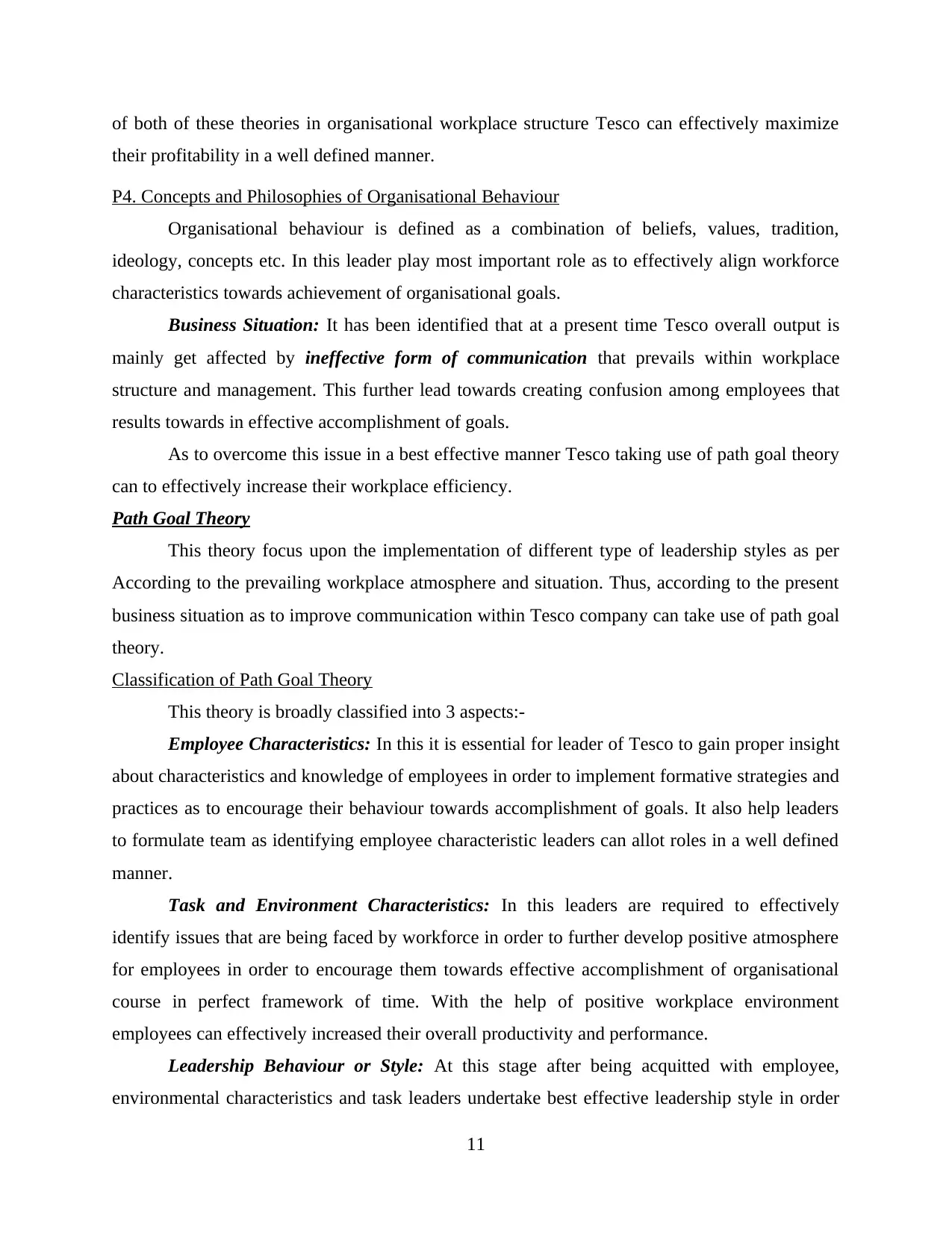
of both of these theories in organisational workplace structure Tesco can effectively maximize
their profitability in a well defined manner.
P4. Concepts and Philosophies of Organisational Behaviour
Organisational behaviour is defined as a combination of beliefs, values, tradition,
ideology, concepts etc. In this leader play most important role as to effectively align workforce
characteristics towards achievement of organisational goals.
Business Situation: It has been identified that at a present time Tesco overall output is
mainly get affected by ineffective form of communication that prevails within workplace
structure and management. This further lead towards creating confusion among employees that
results towards in effective accomplishment of goals.
As to overcome this issue in a best effective manner Tesco taking use of path goal theory
can to effectively increase their workplace efficiency.
Path Goal Theory
This theory focus upon the implementation of different type of leadership styles as per
According to the prevailing workplace atmosphere and situation. Thus, according to the present
business situation as to improve communication within Tesco company can take use of path goal
theory.
Classification of Path Goal Theory
This theory is broadly classified into 3 aspects:-
Employee Characteristics: In this it is essential for leader of Tesco to gain proper insight
about characteristics and knowledge of employees in order to implement formative strategies and
practices as to encourage their behaviour towards accomplishment of goals. It also help leaders
to formulate team as identifying employee characteristic leaders can allot roles in a well defined
manner.
Task and Environment Characteristics: In this leaders are required to effectively
identify issues that are being faced by workforce in order to further develop positive atmosphere
for employees in order to encourage them towards effective accomplishment of organisational
course in perfect framework of time. With the help of positive workplace environment
employees can effectively increased their overall productivity and performance.
Leadership Behaviour or Style: At this stage after being acquitted with employee,
environmental characteristics and task leaders undertake best effective leadership style in order
11
their profitability in a well defined manner.
P4. Concepts and Philosophies of Organisational Behaviour
Organisational behaviour is defined as a combination of beliefs, values, tradition,
ideology, concepts etc. In this leader play most important role as to effectively align workforce
characteristics towards achievement of organisational goals.
Business Situation: It has been identified that at a present time Tesco overall output is
mainly get affected by ineffective form of communication that prevails within workplace
structure and management. This further lead towards creating confusion among employees that
results towards in effective accomplishment of goals.
As to overcome this issue in a best effective manner Tesco taking use of path goal theory
can to effectively increase their workplace efficiency.
Path Goal Theory
This theory focus upon the implementation of different type of leadership styles as per
According to the prevailing workplace atmosphere and situation. Thus, according to the present
business situation as to improve communication within Tesco company can take use of path goal
theory.
Classification of Path Goal Theory
This theory is broadly classified into 3 aspects:-
Employee Characteristics: In this it is essential for leader of Tesco to gain proper insight
about characteristics and knowledge of employees in order to implement formative strategies and
practices as to encourage their behaviour towards accomplishment of goals. It also help leaders
to formulate team as identifying employee characteristic leaders can allot roles in a well defined
manner.
Task and Environment Characteristics: In this leaders are required to effectively
identify issues that are being faced by workforce in order to further develop positive atmosphere
for employees in order to encourage them towards effective accomplishment of organisational
course in perfect framework of time. With the help of positive workplace environment
employees can effectively increased their overall productivity and performance.
Leadership Behaviour or Style: At this stage after being acquitted with employee,
environmental characteristics and task leaders undertake best effective leadership style in order
11
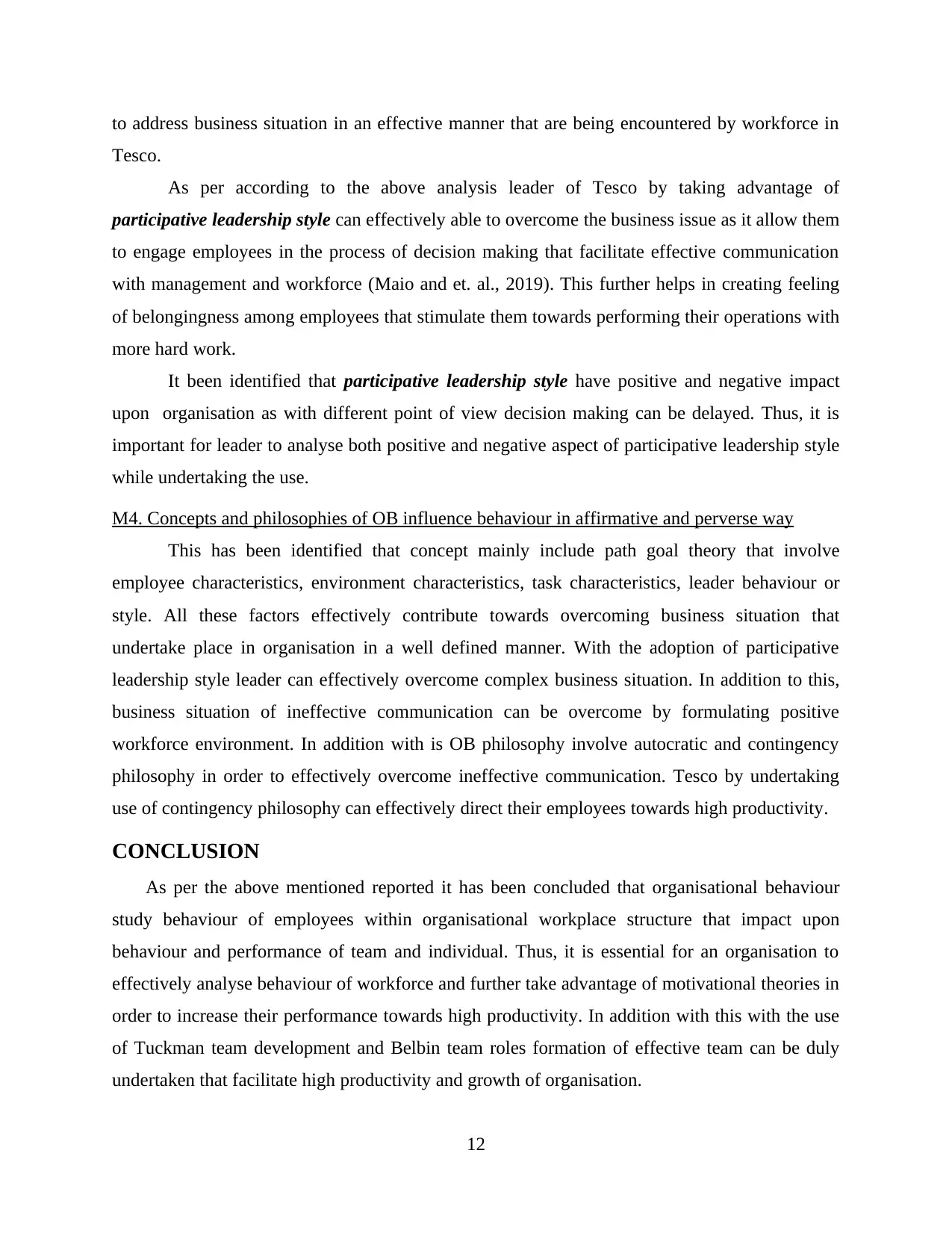
to address business situation in an effective manner that are being encountered by workforce in
Tesco.
As per according to the above analysis leader of Tesco by taking advantage of
participative leadership style can effectively able to overcome the business issue as it allow them
to engage employees in the process of decision making that facilitate effective communication
with management and workforce (Maio and et. al., 2019). This further helps in creating feeling
of belongingness among employees that stimulate them towards performing their operations with
more hard work.
It been identified that participative leadership style have positive and negative impact
upon organisation as with different point of view decision making can be delayed. Thus, it is
important for leader to analyse both positive and negative aspect of participative leadership style
while undertaking the use.
M4. Concepts and philosophies of OB influence behaviour in affirmative and perverse way
This has been identified that concept mainly include path goal theory that involve
employee characteristics, environment characteristics, task characteristics, leader behaviour or
style. All these factors effectively contribute towards overcoming business situation that
undertake place in organisation in a well defined manner. With the adoption of participative
leadership style leader can effectively overcome complex business situation. In addition to this,
business situation of ineffective communication can be overcome by formulating positive
workforce environment. In addition with is OB philosophy involve autocratic and contingency
philosophy in order to effectively overcome ineffective communication. Tesco by undertaking
use of contingency philosophy can effectively direct their employees towards high productivity.
CONCLUSION
As per the above mentioned reported it has been concluded that organisational behaviour
study behaviour of employees within organisational workplace structure that impact upon
behaviour and performance of team and individual. Thus, it is essential for an organisation to
effectively analyse behaviour of workforce and further take advantage of motivational theories in
order to increase their performance towards high productivity. In addition with this with the use
of Tuckman team development and Belbin team roles formation of effective team can be duly
undertaken that facilitate high productivity and growth of organisation.
12
Tesco.
As per according to the above analysis leader of Tesco by taking advantage of
participative leadership style can effectively able to overcome the business issue as it allow them
to engage employees in the process of decision making that facilitate effective communication
with management and workforce (Maio and et. al., 2019). This further helps in creating feeling
of belongingness among employees that stimulate them towards performing their operations with
more hard work.
It been identified that participative leadership style have positive and negative impact
upon organisation as with different point of view decision making can be delayed. Thus, it is
important for leader to analyse both positive and negative aspect of participative leadership style
while undertaking the use.
M4. Concepts and philosophies of OB influence behaviour in affirmative and perverse way
This has been identified that concept mainly include path goal theory that involve
employee characteristics, environment characteristics, task characteristics, leader behaviour or
style. All these factors effectively contribute towards overcoming business situation that
undertake place in organisation in a well defined manner. With the adoption of participative
leadership style leader can effectively overcome complex business situation. In addition to this,
business situation of ineffective communication can be overcome by formulating positive
workforce environment. In addition with is OB philosophy involve autocratic and contingency
philosophy in order to effectively overcome ineffective communication. Tesco by undertaking
use of contingency philosophy can effectively direct their employees towards high productivity.
CONCLUSION
As per the above mentioned reported it has been concluded that organisational behaviour
study behaviour of employees within organisational workplace structure that impact upon
behaviour and performance of team and individual. Thus, it is essential for an organisation to
effectively analyse behaviour of workforce and further take advantage of motivational theories in
order to increase their performance towards high productivity. In addition with this with the use
of Tuckman team development and Belbin team roles formation of effective team can be duly
undertaken that facilitate high productivity and growth of organisation.
12

13
Secure Best Marks with AI Grader
Need help grading? Try our AI Grader for instant feedback on your assignments.
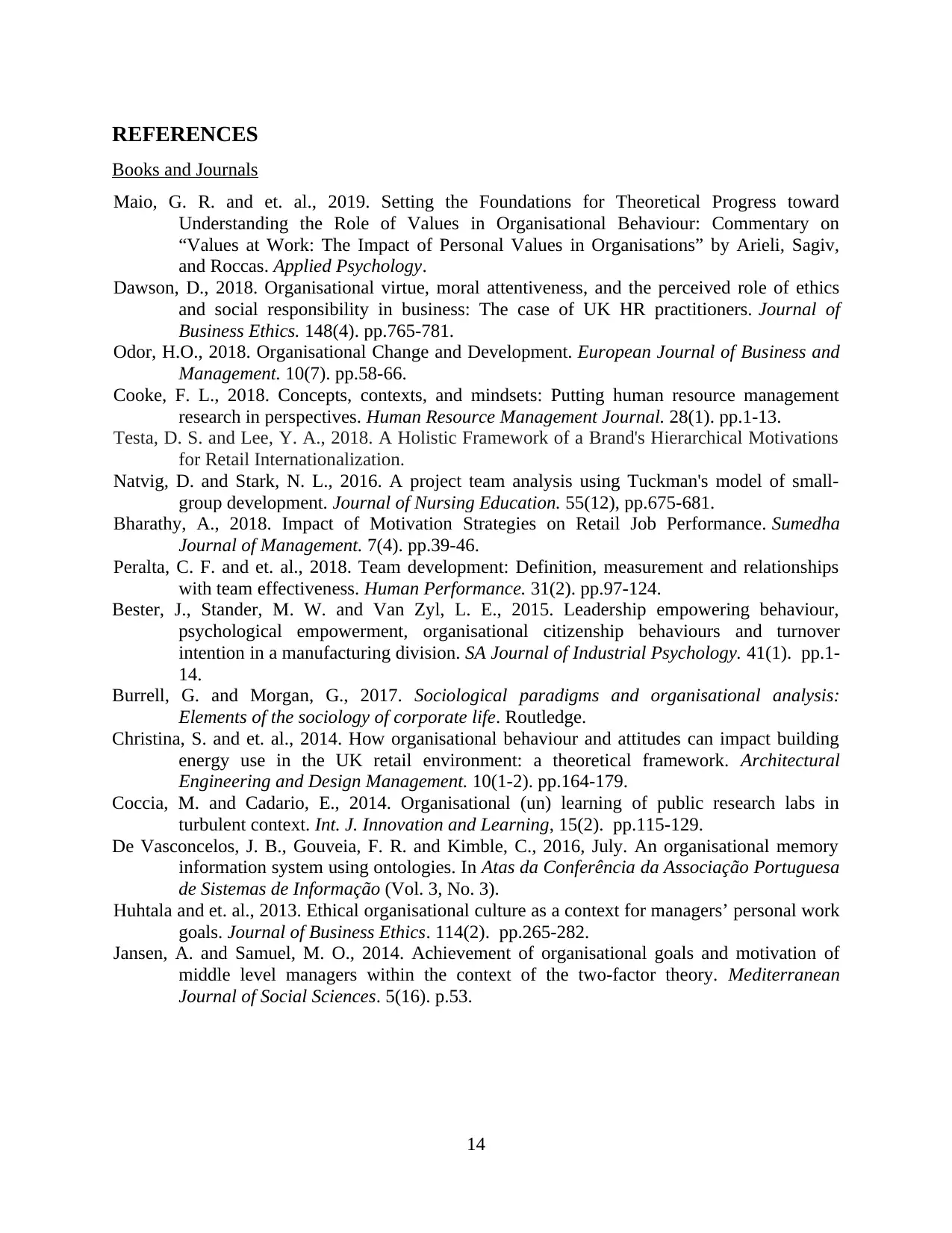
REFERENCES
Books and Journals
Maio, G. R. and et. al., 2019. Setting the Foundations for Theoretical Progress toward
Understanding the Role of Values in Organisational Behaviour: Commentary on
“Values at Work: The Impact of Personal Values in Organisations” by Arieli, Sagiv,
and Roccas. Applied Psychology.
Dawson, D., 2018. Organisational virtue, moral attentiveness, and the perceived role of ethics
and social responsibility in business: The case of UK HR practitioners. Journal of
Business Ethics. 148(4). pp.765-781.
Odor, H.O., 2018. Organisational Change and Development. European Journal of Business and
Management. 10(7). pp.58-66.
Cooke, F. L., 2018. Concepts, contexts, and mindsets: Putting human resource management
research in perspectives. Human Resource Management Journal. 28(1). pp.1-13.
Testa, D. S. and Lee, Y. A., 2018. A Holistic Framework of a Brand's Hierarchical Motivations
for Retail Internationalization.
Natvig, D. and Stark, N. L., 2016. A project team analysis using Tuckman's model of small-
group development. Journal of Nursing Education. 55(12), pp.675-681.
Bharathy, A., 2018. Impact of Motivation Strategies on Retail Job Performance. Sumedha
Journal of Management. 7(4). pp.39-46.
Peralta, C. F. and et. al., 2018. Team development: Definition, measurement and relationships
with team effectiveness. Human Performance. 31(2). pp.97-124.
Bester, J., Stander, M. W. and Van Zyl, L. E., 2015. Leadership empowering behaviour,
psychological empowerment, organisational citizenship behaviours and turnover
intention in a manufacturing division. SA Journal of Industrial Psychology. 41(1). pp.1-
14.
Burrell, G. and Morgan, G., 2017. Sociological paradigms and organisational analysis:
Elements of the sociology of corporate life. Routledge.
Christina, S. and et. al., 2014. How organisational behaviour and attitudes can impact building
energy use in the UK retail environment: a theoretical framework. Architectural
Engineering and Design Management. 10(1-2). pp.164-179.
Coccia, M. and Cadario, E., 2014. Organisational (un) learning of public research labs in
turbulent context. Int. J. Innovation and Learning, 15(2). pp.115-129.
De Vasconcelos, J. B., Gouveia, F. R. and Kimble, C., 2016, July. An organisational memory
information system using ontologies. In Atas da Conferência da Associação Portuguesa
de Sistemas de Informação (Vol. 3, No. 3).
Huhtala and et. al., 2013. Ethical organisational culture as a context for managers’ personal work
goals. Journal of Business Ethics. 114(2). pp.265-282.
Jansen, A. and Samuel, M. O., 2014. Achievement of organisational goals and motivation of
middle level managers within the context of the two-factor theory. Mediterranean
Journal of Social Sciences. 5(16). p.53.
14
Books and Journals
Maio, G. R. and et. al., 2019. Setting the Foundations for Theoretical Progress toward
Understanding the Role of Values in Organisational Behaviour: Commentary on
“Values at Work: The Impact of Personal Values in Organisations” by Arieli, Sagiv,
and Roccas. Applied Psychology.
Dawson, D., 2018. Organisational virtue, moral attentiveness, and the perceived role of ethics
and social responsibility in business: The case of UK HR practitioners. Journal of
Business Ethics. 148(4). pp.765-781.
Odor, H.O., 2018. Organisational Change and Development. European Journal of Business and
Management. 10(7). pp.58-66.
Cooke, F. L., 2018. Concepts, contexts, and mindsets: Putting human resource management
research in perspectives. Human Resource Management Journal. 28(1). pp.1-13.
Testa, D. S. and Lee, Y. A., 2018. A Holistic Framework of a Brand's Hierarchical Motivations
for Retail Internationalization.
Natvig, D. and Stark, N. L., 2016. A project team analysis using Tuckman's model of small-
group development. Journal of Nursing Education. 55(12), pp.675-681.
Bharathy, A., 2018. Impact of Motivation Strategies on Retail Job Performance. Sumedha
Journal of Management. 7(4). pp.39-46.
Peralta, C. F. and et. al., 2018. Team development: Definition, measurement and relationships
with team effectiveness. Human Performance. 31(2). pp.97-124.
Bester, J., Stander, M. W. and Van Zyl, L. E., 2015. Leadership empowering behaviour,
psychological empowerment, organisational citizenship behaviours and turnover
intention in a manufacturing division. SA Journal of Industrial Psychology. 41(1). pp.1-
14.
Burrell, G. and Morgan, G., 2017. Sociological paradigms and organisational analysis:
Elements of the sociology of corporate life. Routledge.
Christina, S. and et. al., 2014. How organisational behaviour and attitudes can impact building
energy use in the UK retail environment: a theoretical framework. Architectural
Engineering and Design Management. 10(1-2). pp.164-179.
Coccia, M. and Cadario, E., 2014. Organisational (un) learning of public research labs in
turbulent context. Int. J. Innovation and Learning, 15(2). pp.115-129.
De Vasconcelos, J. B., Gouveia, F. R. and Kimble, C., 2016, July. An organisational memory
information system using ontologies. In Atas da Conferência da Associação Portuguesa
de Sistemas de Informação (Vol. 3, No. 3).
Huhtala and et. al., 2013. Ethical organisational culture as a context for managers’ personal work
goals. Journal of Business Ethics. 114(2). pp.265-282.
Jansen, A. and Samuel, M. O., 2014. Achievement of organisational goals and motivation of
middle level managers within the context of the two-factor theory. Mediterranean
Journal of Social Sciences. 5(16). p.53.
14
1 out of 17
Related Documents
Your All-in-One AI-Powered Toolkit for Academic Success.
+13062052269
info@desklib.com
Available 24*7 on WhatsApp / Email
![[object Object]](/_next/static/media/star-bottom.7253800d.svg)
Unlock your academic potential
© 2024 | Zucol Services PVT LTD | All rights reserved.





